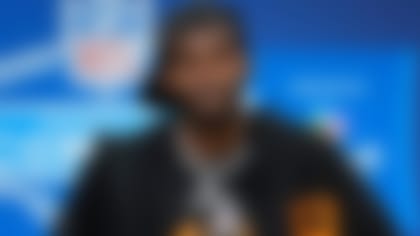NASHVILLE, Tenn. -- As we learn more about the details surrounding Steve McNair's death, we're also finding out more about his life. The things he did on the football field to make us all feel his loss are the things we'll hang on to most, but the strange circumstances that led up to his murder make so many things hard to decipher.
That's why his former coach, Jeff Fisher, nearly cried Monday when saying McNair, at this time, would ask for forgiveness. Former teammate Eddie George said not to judge McNair but honor what he did to make himself a hero to so many people. Kevin Dyson, who caught a pass from McNair but fell only one yard short of scoring a potential game-tying touchdown in the Tennessee Titans' lone Super Bowl, said McNair's death shouldn't be an example used to preach to young people about doing things certain ways.
Instead, McNair's death should be a reminder that we need to appreciate every breath we take and everyone we know who shares that air.
"My thing, what I would say to this new generation or this new group coming in, respect and appreciate what you have now because you never know," Dyson said. "Appreciate what you have because this is a very short window. Some are fortunate enough to play 13 years like Steve McNair. Some, like myself, have their career shortened by injuries. Appreciate what you have every year. You're a play away, a year away -- a situation away -- from it being over."
McNair's murder has ripped through two families, his and that of Sahel Kazemi, his 20-year-old girlfriend whose body was found near his, lying on top of what police believe was the semiautomatic handgun used in both of their deaths. Kazemi purchased the gun two days before both were found dead in McNair's Nashville condo, police said. All indications are that it was a murder-suicide, but police are investigating all angles.
McNair's dalliance with a woman 16 years younger than him, while he was married, has sullied his saintly image. His violent death -- and hers -- is something hard for many to stomach. That reality, on top of McNair being gone, won't make moving on any easier for his family, especially his children, who, by all accounts, were the most important things in his life.
It's hard to look back on McNair's life as a football player when all this is staring you in the face.
Yet, it was McNair the football player who has made us pay attention to all this. It's impossible not to equate McNair with one of the toughest guys to ever play the sport in the NFL. He was the epitome of a throwback player, who viewed pain-numbing shots as part of his equipment and saw opposing defenses as chum.
George, Fisher and Dyson all cited the same example when talking about McNair: In one of the quarterback's first games after back surgery, Tennessee was facing the Pittsburgh Steelers. McNair had been wincing in pain from the outset. He wasn't all the way healthy, but he never really was. As Tennessee was driving, McNair dove over a pile and was drilled. Repeatedly. He landed on the area of his back where he had the surgery. He got up and came back to the huddle to 10 other stunned teammates. He was hurting, but he was in that huddle.
"From that point on, there wasn't a player who was coming off the field unless it was on a stretcher," George said. "He seemed to almost enjoy the pain."
It wasn't McNair's refusal to buckle to the poundings that showed his true character, George said. It was how McNair handled the adversity that he didn't generate but often faced.
As the No. 3 overall draft pick by the Houston Oilers in 1995, expectations were high, but McNair rarely played early in his NFL career. By the time McNair was ready, the team was set to move from Houston to Tennessee. Fans bailed. Upon arrival in Tennessee, the Oilers didn't really have a home or fan base, playing in Memphis and at Vanderbilt Stadium in Nashville while a permanent stadium was built.
"All we had was us," George said.
During this evolution, McNair struggled, running when he should have thrown, throwing when he should have ran. He played in a run-first offense that didn't fit his skill set. He was booed. Fans wanted him benched. But Fisher stuck with him, and McNair eventually prospered. In 1999, when the team was renamed the Titans and moved into its permanent home, McNair engineered a Super Bowl run.
"He put this organization on the map here in Tennessee," Fisher said of McNair.
That ascension from despair showed more about McNair than anything, George said. Few of today's quarterbacks would play through such turmoil. Instead, they would demand to be traded or gripe to the media or simply opt not to earn their potential reward. You don't have to look far to figure out which players George meant.
Even after an ugly split with the Titans resulted in McNair being traded to the Baltimore Ravens in 2006, he returned to Nashville when he retired after the 2007 season. Fisher offered McNair a chance to attend the Titans' minicamp this year to mentor some of the team's young players and to see if maybe he wanted to eventually coach. Fisher didn't mention McNair tutoring quarterback Vince Young, who lost his starting job last season, but Young and McNair had a strong bond that might have helped the young pro fight through his struggles and possibly turn the corner, as McNair once did.
Young, like so many others, is devastated by McNair's death, according to his agent, Major Adams. Whether McNair's presence would have helped Young is just another unanswered question to add into the hundreds of others surrounding McNair's death.
It seems that no matter how many ways you look at McNair's life or his death, it's hard to recall everything he did knowing that there was still so much he could have done.



